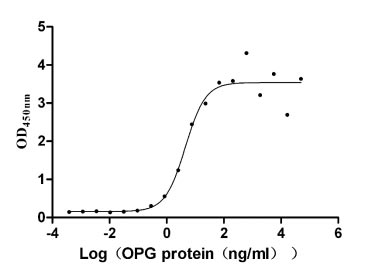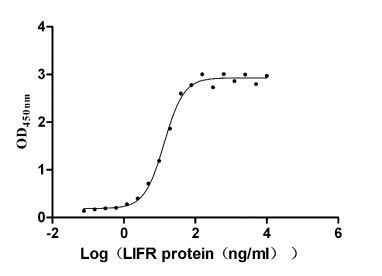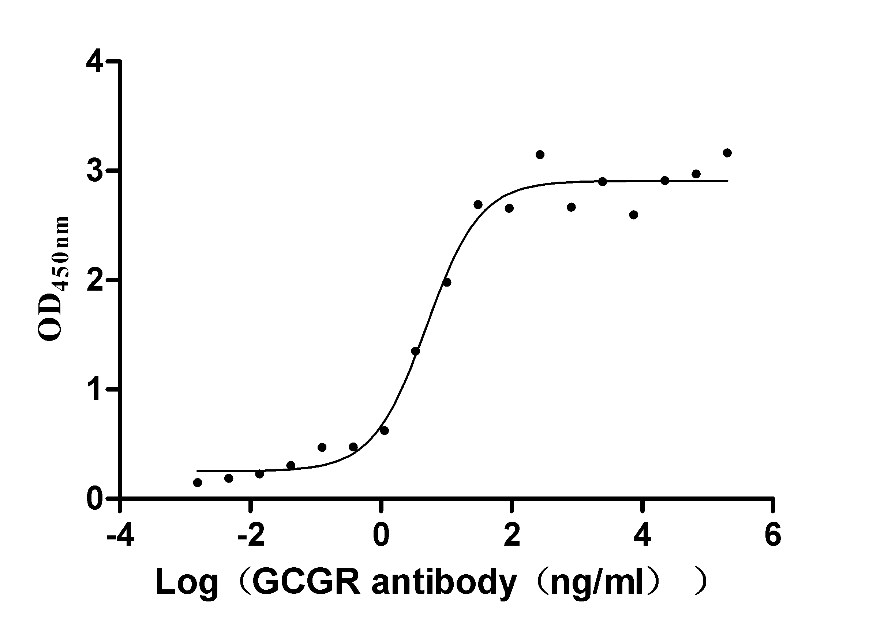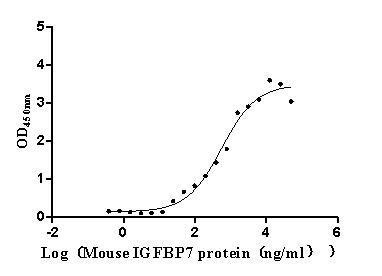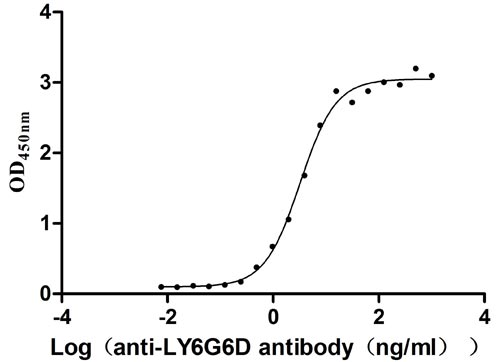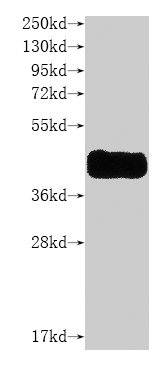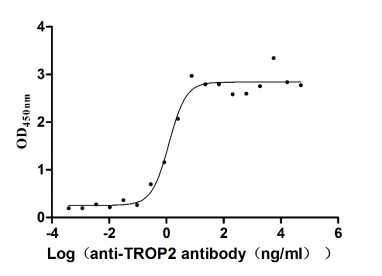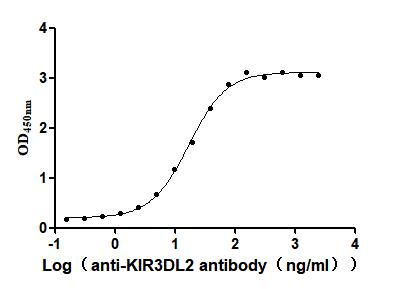Recombinant Saccharomyces cerevisiae RNA polymerase II-associated protein 1 (PAF1)
-
货号:CSB-YP020094SVG
-
规格:
-
来源:Yeast
-
其他:
-
货号:CSB-EP020094SVG
-
规格:
-
来源:E.coli
-
其他:
-
货号:CSB-EP020094SVG-B
-
规格:
-
来源:E.coli
-
共轭:Avi-tag Biotinylated
E. coli biotin ligase (BirA) is highly specific in covalently attaching biotin to the 15 amino acid AviTag peptide. This recombinant protein was biotinylated in vivo by AviTag-BirA technology, which method is BriA catalyzes amide linkage between the biotin and the specific lysine of the AviTag.
-
其他:
-
货号:CSB-BP020094SVG
-
规格:
-
来源:Baculovirus
-
其他:
-
货号:CSB-MP020094SVG
-
规格:
-
来源:Mammalian cell
-
其他:
产品详情
-
纯度:>85% (SDS-PAGE)
-
基因名:PAF1
-
Uniprot No.:
-
别名:PAF1; YBR279W; YBR2016; RNA polymerase II-associated protein 1; Protein PAF1
-
种属:Saccharomyces cerevisiae (strain ATCC 204508 / S288c) (Baker's yeast)
-
蛋白长度:full length protein
-
表达区域:1-445
-
氨基酸序列MSKKQEYIAP IKYQNSLPVP QLPPKLLVYP ESPETNADSS QLINSLYIKT NVTNLIQQDE DLGMPVDLMK FPGLLNKLDS KLLYGFDNVK LDKDDRILLR DPRIDRLTKT DISKVTFLRR TEYVSNTIAA HDNTSLKRKR RLDDGDSDDE NLDVNHIISR VEGTFNKTDK WQHPVKKGVK MVKKWDLLPD TASMDQVYFI LKFMGSASLD TKEKKSLNTG IFRPVELEED EWISMYATDH KDSAILENEL EKGMDEMDDD SHEGKIYKFK RIRDYDMKQV AEKPMTELAI RLNDKDGIAY YKPLRSKIEL RRRRVNDIIK PLVKEHDIDQ LNVTLRNPST KEANIRDKLR MKFDPINFAT VDEEDDEDEE QPEDVKKESE GDSKTEGSEQ EGENEKDEEI KQEKENEQDE ENKQDENRAA DTPETSDAVH TEQKPEEEKE TLQEE
-
蛋白标签:Tag type will be determined during the manufacturing process.
The tag type will be determined during production process. If you have specified tag type, please tell us and we will develop the specified tag preferentially. -
产品提供形式:Lyophilized powder
Note: We will preferentially ship the format that we have in stock, however, if you have any special requirement for the format, please remark your requirement when placing the order, we will prepare according to your demand. -
复溶:We recommend that this vial be briefly centrifuged prior to opening to bring the contents to the bottom. Please reconstitute protein in deionized sterile water to a concentration of 0.1-1.0 mg/mL.We recommend to add 5-50% of glycerol (final concentration) and aliquot for long-term storage at -20℃/-80℃. Our default final concentration of glycerol is 50%. Customers could use it as reference.
-
储存条件:Store at -20°C/-80°C upon receipt, aliquoting is necessary for mutiple use. Avoid repeated freeze-thaw cycles.
-
保质期:The shelf life is related to many factors, storage state, buffer ingredients, storage temperature and the stability of the protein itself.
Generally, the shelf life of liquid form is 6 months at -20°C/-80°C. The shelf life of lyophilized form is 12 months at -20°C/-80°C. -
货期:Delivery time may differ from different purchasing way or location, please kindly consult your local distributors for specific delivery time.Note: All of our proteins are default shipped with normal blue ice packs, if you request to ship with dry ice, please communicate with us in advance and extra fees will be charged.
-
注意事项:Repeated freezing and thawing is not recommended. Store working aliquots at 4°C for up to one week.
-
Datasheet :Please contact us to get it.
靶点详情
-
功能:The PAF1 complex is a multifunctional complex. Involved in transcription initiation via genetic interactions with TATA-binding proteins. Involved in elongation. It regulates 3'-end formation of snR47 by modulating the recruitment or stable association of NRD1 and NAB3 with RNA polymerase II. Also has a role in transcription-coupled histone modification. Required for activation of the RAD6/UBC2-BRE1 ubiquitin ligase complex, which ubiquitinates histone H2B to form H2BK123ub1. Also required for the methylation of histone H3 by the COMPASS complex to form H3K4me, by SET2 to form H3K36me, and by DOT1 to form H3K79me. RNA polymerase II associated protein important for transcription of a subset of genes. Required for both positive and negative regulation. Negatively regulates MAK16 expression. Also required for efficient CLN2 transcription in late G1 and may be involved in transcription of galactose-inducible genes.
-
基因功能参考文献:
- results outline complex interactions, in cis and in trans, between genes encoding PAF1 and ESCRT-II complex components that affect telomere function and cell viability in yeast PMID: 29564528
- work provides structural insights into the overall architecture of the Paf1 complex and paves the road forward for understanding the molecular mechanisms of the Paf1 complex in transcriptional regulation. PMID: 30224485
- Our results are consistent with a model in which cotranscriptional methylation of histone H3 K4, mediated by the Paf1 complex and noncoding transcription, leads to activation of ECM3 transcription PMID: 27449519
- Paf1 has 2 distinct functions: a core general function in transcription elongation, satisfied by the lowest Paf1 levels, and a regulatory function in determining differential transcript fate by varying the level of Paf1 on Pol2. PMID: 28190769
- This study demonstrates that the recruitment of the Saccharomyces cerevisiae Paf1 complex to active genes requires a domain of Rtf1 that directly interacts with the Spt4-Spt5 complex. PMID: 23775116
- a broad requirement for the Paf1 in snoRNA 3'-end formation in S. cerevisiae PMID: 23109428
- Ctr9 has function distinct from its established role in the Paf1 complex. PMID: 22446411
- Rtf1 subunit of PAF1 complex can promote ubiquitylation of H2B K123 in yeast. PMID: 22699496
- By promoting histone H2B lysine 123 ubiquitylation, Paf1 represses the ARG1 gene by negatively affecting Gcn4 occupancy at the promoter. PMID: 22252319
- Paf1 and Ctr9 repress SER3 by maintaining SRG1 transcription-dependent nucleosome occupancy. PMID: 21873510
- RNA polymerase II-associated factor 1 complex (Paf1c) has roles in different subpathways of nucleotide excision repair PMID: 21737840
- Leo1 subunit of the yeast paf1 complex binds RNA and contributes to complex recruitment PMID: 20732871
- Paf1C has an effect on newly synthesized mRNAs as they exit the nucleus PMID: 15643076
- The PAF1 protein complex is associated with Pol II at initiation and during elongation, these critical Paf1-dependent changes in transcript abundance are due to alterations in posttranscriptional processing. PMID: 16246724
- The Paf1 complex associates with and facilitates Nrd1 recruitment to the SNR47 gene, suggesting a direct involvement in 3' end formation. PMID: 16246725
- Paf1 is required for silencing and lysine 4 (K4)-methylated histone H3 at the rDNA, suggesting a possible direct role for K4-methylated H3 in gene silencing. PMID: 16582434
- Results indicate that Rtf1 influences transcription and chromatin structure through several independent functional domains and that Rtf1 may function independently of its association with other members of the Paf1 complex. PMID: 17576814
- Paf1 complex genes, affect telomere length via telomerase RNA abundance PMID: 18411302
- Paf1 complex provides a point of contact for recruitment of 3'-end processing factors at an early point in the transcription cycle. PMID: 18469135
- Paf1C promotes Pol I transcription through the rDNA by increasing the net rate of elongation PMID: 19164765
显示更多
收起更多
-
亚细胞定位:Nucleus, nucleoplasm.
-
蛋白家族:PAF1 family
-
数据库链接:
KEGG: sce:YBR279W
STRING: 4932.YBR279W
Most popular with customers
-
Recombinant Human Tumor necrosis factor receptor superfamily member 11B (TNFRSF11B) (Active)
Express system: Mammalian cell
Species: Homo sapiens (Human)
-
Recombinant Human Leukemia inhibitory factor receptor (LIFR), partial (Active)
Express system: Mammalian cell
Species: Homo sapiens (Human)
-
Recombinant Human Glucagon receptor (GCGR), partial (Active)
Express system: Mammalian cell
Species: Homo sapiens (Human)
-
Recombinant Mouse Complement component C1q receptor (Cd93), partial (Active)
Express system: Mammalian cell
Species: Mus musculus (Mouse)
-
Recombinant Human Lymphocyte antigen 6 complex locus protein G6d (LY6G6D) (Active)
Express system: Yeast
Species: Homo sapiens (Human)
-
Recombinant Human C-C chemokine receptor type 8 (CCR8)-VLPs (Active)
Express system: Mammalian cell
Species: Homo sapiens (Human)
-
Recombinant Human Tumor-associated calcium signal transducer 2 (TACSTD2), partial (Active)
Express system: Mammalian cell
Species: Homo sapiens (Human)
-
Recombinant Human Killer cell immunoglobulin-like receptor 3DL2 (KIR3DL2), partial (Active)
Express system: Mammalian cell
Species: Homo sapiens (Human)


